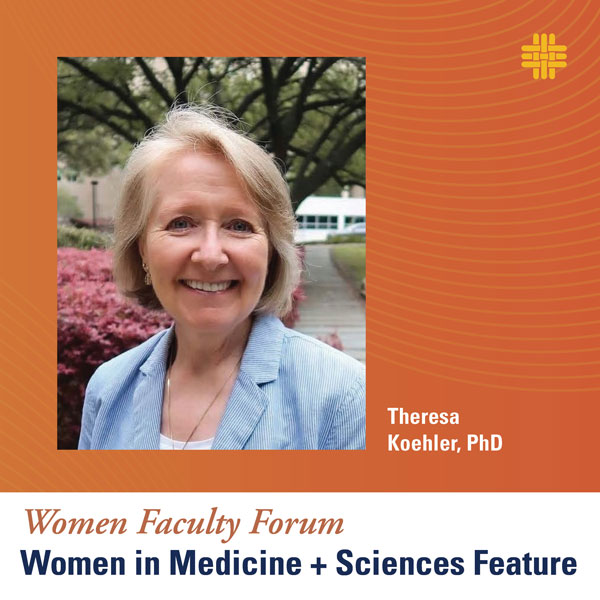Women in Medicine & Sciences Feature: Theresa Koehler, PhD

Each month, the Women Faculty Forum presents its Women in Medicine and Sciences Feature, highlighting the women faculty at McGovern Medical School who are leaders in medicine, research, and education.
This month’s feature is Theresa Koehler, PhD, chair emerita for the Department of Microbiology and Molecular Genetics.
What is your background? When did you join UTHealth Houston?
I am a naturalized Texan. I was born and raised in the Washington, DC area, and I spent the first half of my life on the East Coast of the U.S. I earned a BS in biology at Virginia Tech and a MS and PhD at the University of Massachusetts, Amherst. My postdoctoral training was in Boston at Harvard Medical School.
I arrived in Houston in January of 1991, to be part of the new Department of Microbiology at what was then known as The University of Texas Medical School – Houston Health Science Center. I came here because I was intrigued and excited about participating in the development of a new department and graduate program – a unique opportunity for an assistant professor. In addition, I knew that the tremendous resources of the TMC would be great sources of support for my research program.
What inspired you to pursue a career in science?
As is true for many people, my career path was inspired by a teacher. My elementary school teacher, Ms. Nelson, was a science enthusiast. She introduced me to the “How and Why Wonder Books,” a vast collection of books that explored physical and natural sciences. My parents purchased every book in the series that we could find during those pre-internet days. The books often presented science as a series of experiments. As a 10-year old, I was excited to realized that every answer leads to more questions.
What are the primary research interests that drove your career, and what are you pursuing now?
I have always been interested in fundamental biological processes. I love asking questions out of pure interest. Microbiology is a terrific research discipline, because one can genetically manipulate and culture microorganism with relative ease, allowing facile observations of the physiology and behavior of individual cells, communities of cells, and cells in association with various hosts.
I became chair emerita in January of this year. I loved my 30+ years at McGovern, but I felt the need for change. I am exploring a number of volunteer activities within and outside of science and academia. My emerita status allows me to continue to contribute to the microbiology community, locally to my department at McGovern and at the national level as a member of advisory boards and as incoming president-elect of the American Society for Microbiology. I am also using my leadership skills in my role as president of my church congregation. I am very happy.
Who are your role models?
I have been fortunate to have been trained by multiple people who served as unique role models. As a young faculty, I was inspired by Dr. Samuel Kaplan, the founding chair of my department. His enthusiasm for microbiology and academic research was infectious. My postdoc mentor, Dr. R. John Collier, modeled intellectual discipline, critical data analysis, and a nose-to-the-grindstone approach to pursuing scientific questions.
My graduate adviser, Dr. Curtis Thorne, exuded a sense of wonder that drove his trainees to think outside of the box. Dr. G. William Claus, my undergraduate microbiology professor, modeled professionalism and compassion for students.
Finally, as my research program progressed and my circle of colleagues grew, I was influenced greatly by Dr. Alison O’Brien, with whom I shared many scientific and personal interests. Now retired, Dr. O’Brien attained international recognition for her work on microbial toxins. She was chair of the Department of Microbiology and Immunology at the Uniformed Services University of the Health Sciences, and she served as president of the American Society for Microbiology. Dr. O’Brien was an exemplary woman leader in microbiology who always made time for mentoring and sponsoring junior scientists.
What did you enjoy most about working at UTHealth Houston?
Hands down, I loved having a role in the training of the next generation of research scientists. The young researchers of UTHealth Houston, with their enthusiasm and intellect, provided a constant source of inspiration for me. I had so much fun running my lab.
How do you think UTHealth Houston can further support female faculty?
Over the past 20 years, our medical school has greatly increased efforts designed to support women faculty. I especially applaud the initiatives of the Office of Faculty Affairs that recognize the outstanding contributions of women faculty of McGovern.
Nevertheless, we still have a dearth of women in leadership roles, from department chairs to upper administration. Historically, one factor that has negatively affected the advancement of women to leadership roles in academia is the culture of “moving to move up.” Often, to rise to the next level, academics have had to seek opportunities at other institutions. On some search committees, there is a perception that to get fresh perspectives and creative ideas, you need to recruit people from outside the institution. That way of thinking can be particularly detrimental to women, who are often less mobile than their male colleagues because of partner and family ties.
We do have examples of women leaders at UTHealth Houston who were promoted from within. I am one of them. Yet, we need to do better. National searches for leadership positions are appropriate, but we should not discount the abilities of internal candidates with experience at our own institution. It is in the best interest of our university to encourage the advancement of our own.